|
|
|
Sort Order |
|
|
|
Items / Page
|
|
|
|
|
|
|
| Srl | Item |
| 1 |
ID:
189247
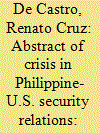

|
|
|
|
|
| Summary/Abstract |
This article explores the prospect of transforming the Philippine-U.S. alliance into a security partnership. In the past, the Philippines doubted the U.S.’s often-repeated commitment to assist its ally because the 1951 Philippine-U.S. Mutual Defence Treaty (MDT) merely stipulated consultation rather than an automatic armed response in case of an armed conflict. In mid-2011, the Aquino Administration asked for an unequivocal U.S. guarantee to defend the Philippines and its naval/air units deployed in the Spratlys. The Duterte Administration, however, has expressed its uncertainty over America’s willingness to back the Philippines militarily in any confrontation with China over the disputed maritime territory. Early this year, President Rodrigo Duterte commented that an armed clash in the South China Sea would crush the Philippines because the involvement of American forces would make the conflict spiral out of control. This development, along with his decision to abrogate the 1997 Philippine-U.S. Visiting Forces Agreement (VFA), has generated a crisis in the alliance. To avert any break-down in their overall security relations, the two allies can explore the possibility of downgrading their alliance to a security partnership. In conclusion, the article argues that should the Philippines consider this option, it must take into account the following: the consequence of losing the deterrence effect of a defence treaty with the world’s most powerful nation; the impact on Philippine defence spending; on the ongoing Armed Forces of the Philippines’ (AFP’s) modernisation program; and whether or not the Filipino nation will support this move.
|
|
|
|
|
|
|
|
|
|
|
|
|
|
|
|
| 2 |
ID:
139721
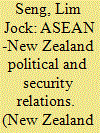

|
|
|
|
|
| Summary/Abstract |
Lim Jock Seng provides a Brunei Darussalam perspective.
|
|
|
|
|
|
|
|
|
|
|
|
|
|
|
|
| 3 |
ID:
104381
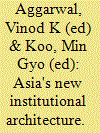

|
|
|
|
|
| Publication |
Berlin, Springer, 2008.
|
| Description |
vii, 321p.
|
| Series |
Political economy of the Asia Pacific
|
| Standard Number |
9783540748878
|
|
|
|
|
|
|
|
|
|
|
|
Copies: C:1/I:0,R:0,Q:0
Circulation
| Accession# | Call# | Current Location | Status | Policy | Location |
| 055976 | 352.01095/AGG 055976 | Main | On Shelf | General | |
|
|
|
|
| 4 |
ID:
156328
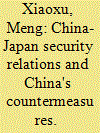

|
|
|
|
|
| Summary/Abstract |
Since the nationalization of the Diaoyu Islands by Japan in 2012, mutual trust between China and Japan has been declining, and bilateral security relations have reached a low point. In the near future, China-Japan security relations will face more challenges than opportunities. China should make measures to impose necessary pressure on Japan and to strengthen interpersonal communication and understanding between people of the two countries.
|
|
|
|
|
|
|
|
|
|
|
|
|
|
|
|
| 5 |
ID:
139885
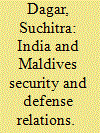

|
|
|
|
|
| Summary/Abstract |
ndia forms the core country of South Asia. The defense and security factors with which it must cope are extensive. Among the region’s nations, India has by far the most advanced industrial and technological base, including an indigenous armament industry that is the largest among Third World states in value, volume, diversity of manufacture, and research and development facilities. Moreover, India has a large public and private basic industrial sector that serves as a foundation for economic development.
|
|
|
|
|
|
|
|
|
|
|
|
|
|
|
|
| 6 |
ID:
075057
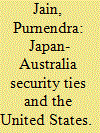

|
|
|
|
|
| Publication |
2006.
|
| Summary/Abstract |
This article considers recent developments in Australia-Japan security and defence ties and their trilateral dimension with the United States. I argue that the security links bilaterally and through their main ally the US have scope for development while the three nations share perceptions of security and strategic matters. However, there are elements of inherent unpredictability that may come into play to hinder the move towards a further strengthening of the current trilateral security arrangement. Possible impediments come from both external and internal sources making it difficult for the three nations to transform their trilateral security relations into an institution, alliance or treaty that formally links the three partners strategically.
|
|
|
|
|
|
|
|
|
|
|
|
|
|
|
|
| 7 |
ID:
075035
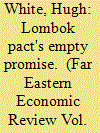

|
|
|
|
|
| Publication |
2006.
|
| Summary/Abstract |
Hugh White, visiting fellow at the Lowy Institute and professor at Australian National University in Canberra, examines the recently signed security pact between Indonesia and Australia and discovers only hollow promises.
|
|
|
|
|
|
|
|
|
|
|
|
|
|
|
|
| 8 |
ID:
140090
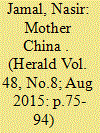

|
|
|
| 9 |
ID:
129062
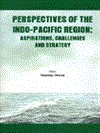

|
|
|
|
|
| Publication |
New Delhi, Vij Books India Pvt.Ltd., 2014.
|
| Description |
xxix, 201p.Hbk
|
| Contents |
Based on proceedings of National security seminar 2013 held at USI, New Delhi on 07-08 Nov 2013
|
| Standard Number |
9789382652625
|
|
|
|
|
|
|
|
|
|
|
|
Copies: C:1/I:0,R:0,Q:0
Circulation
| Accession# | Call# | Current Location | Status | Policy | Location |
| 057691 | 355.03301650164/DEW 057691 | Main | On Shelf | General | |
|
|
|
|
| 10 |
ID:
072811
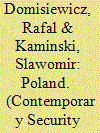

|
|
|
|
|
| Publication |
2005.
|
| Summary/Abstract |
The United States has not yet invited Poland to join its missile defence programme. Yet Poland is one of the countries most likely to welcome such a request. Major elements of the Polish political system are positively inclined to missile defence, not because the country faces direct WMD threats, but because it would further cement security relations with Washington. In so far as Poland worries about WMD threats, its fears are directed not at regional proliferators, but at Russia.
A Polish response to a potential offer would take into consideration a number of strategic interests. First, Warsaw's participation in missile defence should bring added value to international security, buttressing the defensive capacity of NATO and the European Union. Political relations with neighbours cannot suffer as a consequence of missile defence engagement. Second, it should help deepen bilateral and multilateral strategic ties with the United States. Third, missile defence must be treated as but one facet of the adaptation of global institutions and means of response to new security threats and challenges. A relative paucity of debate on missile defence in Poland can be explained by the weakness of the non-governmental policy community, the strong role of the executive branch in relation to the legislative in security and defence, and the technical orientation of this problématique as well as strong public and elite support for trans-Atlanticism.
|
|
|
|
|
|
|
|
|
|
|
|
|
|
|
|
| 11 |
ID:
006829
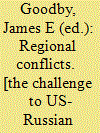

|
|
|
|
|
| Publication |
Oxford, Oxford Univesity Press, 1995.
|
| Description |
xv,251p.
|
| Standard Number |
01982901X
|
|
|
|
|
|
|
|
|
|
|
|
Copies: C:1/I:0,R:0,Q:0
Circulation
| Accession# | Call# | Current Location | Status | Policy | Location |
| 038814 | 327.73047/GOO 038814 | Main | On Shelf | General | |
|
|
|
|
| 12 |
ID:
104100
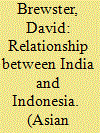

|
|
|
| 13 |
ID:
105343
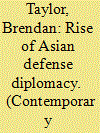

|
|
|
|
|
| Publication |
2011.
|
| Summary/Abstract |
The rise of multilateral defense diplomacy in Asia is an important new phenomenon. In addition to the newly established ADMM+ process and the Shangri-La Dialogue (SLD), ASEAN defense ministers, ASEAN chiefs of defense and ASEAN chiefs of intelligence are now all meeting on a regular basis. Such gatherings were almost unthinkable as recently as a decade ago. This paper seeks to interpret these developments and their implications for the Sino-Australian security relationship. It argues that while these recent developments appear to reflect a deepening of Asian security cooperation, they are actually a manifestation of an intensifying institutional competition, namely between the ASEAN-centered ADMM and the Western-backed SLD. This, in turn, is symptomatic of a broader institutional contestation--reflecting underlying strategic competition--which is becoming a distinctive feature of Asia's emerging security 'architecture.' The paper goes on to argue that China and Australia find themselves on opposite sides of this competition and, particularly in the area of defense diplomacy, are likely to become increasingly important players in fuelling it. The paper concludes by observing why such a dynamic is potentially problematic and offers a modest set of policy recommendations designed to assist Beijing and Canberra in addressing and alleviating their competitive tendencies.
|
|
|
|
|
|
|
|
|
|
|
|
|
|
|
|
| 14 |
ID:
062301
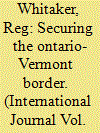

|
|
|
|
|
| Publication |
Winter 2004-05.
|
|
|
|
|
|
|
|
|
|
|
|
|
|
|
|
| 15 |
ID:
075381
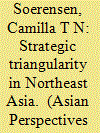

|
|
|
|
|
| Publication |
2006.
|
| Summary/Abstract |
The Sino-Japanese security relationship is in jeopardy of deteriorating further in the years to come, a development that will have strong implications for Northeast Asian security. Identifying factors that can push the relationship in a positive direction toward reconciliation and cooperation is thus an urgent task. This article argues that the worsened Sino-Japanese security relationship is primarily caused by three developments: the end of the cold-war bipolarity, the dramatic development of the Chinese economy and military, and the neglect or failure of the United States to ensure a balance in its security relations with China and Japan. The United States in many ways holds the key to moving the Sino-Japanese security relationship in a positive direction. Perspectives regarding the development of a more constructive U.S. role are discussed.
|
|
|
|
|
|
|
|
|
|
|
|
|
|
|
|
| 16 |
ID:
073526
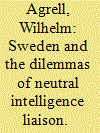

|
|
|
|
|
| Publication |
2006.
|
| Summary/Abstract |
Throughout the Cold War Sweden pursued a declared policy of non-alignment. Sweden nevertheless established security links with a number of Western powers, first of all Britain and the US. The most extensive links were developed in two areas - military technology and intelligence. Intelligence liaison was of crucial importance for the security of non-aligned Sweden, but also significant for the major Western powers in filling gaps in intelligence collection. But intelligence liaison also served as an instrument in a closed policy arena where Sweden could receive or pay back favours, according to a pattern established already during World War II. However, intelligence liaison contained policy dilemmas, some of a more general nature, some specific for a country with an overt policy of non-alignment.
|
|
|
|
|
|
|
|
|
|
|
|
|
|
|
|
| 17 |
ID:
125254
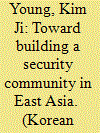

|
|
|
|
|
| Publication |
2013.
|
| Summary/Abstract |
Despite the high-level economic interdependence and cultural exchange among major regional actors, the current security environment of Northeast Asia is rather volatile. The tension surrounding North Korean military aggression, the Taiwan Strait, and the East/South China Sea indicates the necessity of a security mechanism that restrains the aggressive actions of the regional actors involved. One viable option is to build a security community within which member states share an expectation of settling their differences through peaceful means. Based on an examination of the current state of security cooperation among South Korea, China, and Japan, this paper argues that the main impediment to a sustainable regional security community has been identity conflict caused by the history disputes among the three countries, not the lack of institutional settings or U.S. support. Shared identity and the concomitant mutual trust are prerequisites for genuine security cooperation. Therefore, this paper suggests the reconciliation process between South Korea and Japan as the initial step toward building an East Asian security community, paying attention to its implications for South Korea-China- Japan reconciliation.
|
|
|
|
|
|
|
|
|
|
|
|
|
|
|
|
| 18 |
ID:
159571
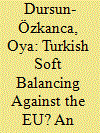

|
|
|
|
|
| Summary/Abstract |
Turkey is increasingly criticized for obstructing communication and coordination between the European Union (EU) and the North Atlantic Treaty Organization (NATO). Using soft balancing theory and drawing on fieldwork and semistructured elite interviews conducted in Turkey, this article provides an in-depth analysis of Turkey’s foreign policy that leads to an impasse in NATO–EU coordination. It identifies three main reasons behind the Turkish foreign policy on the topic: (1) Turkey’s resentment for its exclusion from European security developments, (2) the uncertainties revolving around Turkey’s EU membership prospects and the subsequent lack of trust toward the EU, and (3) the unresolved Cyprus problem. This article concludes that the provision of a credible roadmap for Turkey’s EU membership and the resolution of the Cyprus conflict are central for breaking the NATO–EU security impasse, both of which seem unlikely in the short to medium run.
|
|
|
|
|
|
|
|
|
|
|
|
|
|
|
|
| 19 |
ID:
072476
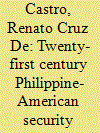

|
|
|
|
|
| Publication |
2006.
|
| Summary/Abstract |
This paper examines the changing nature of twenty-first century Philippine-US security relations. It notes that the alliance is against a non-state actor, and raises the possibility that this security arrangement might be difficult to maintain given its prohibitive governance cost and the systemic nature of the threat. It also observes that the alliance has been plagued by dissension between the two countries. In conclusion, the article maintains that these two allies have compelling reasons to revitalize and maintain their security ties. They have also developed forms of cooperation to reduce the alliance's governance costs, iron out their differences, limitations and conflicting interests, and ensure that the partnership will remain functional in the face of new and long-term security challenges posed by international terrorism.
|
|
|
|
|
|
|
|
|
|
|
|
|
|
|
|
| 20 |
ID:
132875


|
|
|
|
|
| Publication |
2014.
|
| Summary/Abstract |
This article reflects on application of the concept of strategic culture to supply analytical and policy-relevant guidance to those who ponder the future of security relations in the Asia-Pacific. Argued here is that, notwithstanding some obvious problems with the concept, there is utility in the application of strategic culture to the analysis of regional security challenges. To claim that strategic culture may not be equally applicable to all states in the Asia-Pacific region is not the same as saying it has no applicability at all, especially if the states to which it is applicable are important regional actors. This article suggests that both an old approach derivative of national character, and a new one associated with path dependence, might together prove fruitful for policy analysts and policy-makers alike, as they wrestle with what many assume to be the fundamental question of the coming half-century in the Asia-Pacific, namely whether a great power war in the region can be averted. Although there is much variation in the manner with which authors apply the master concept of strategic culture to their specific Asia-Pacific cases, each takes seriously the utility of a cultural approach to national strategic choice. So while the quest for reliable causality and predictive capability on a region-wide basis may remain that of the will-o'-the-wisp, there can be no gainsaying that, on a case-by-case basis, the authors show that the approach can demonstrate valuable insights into the policy dilemmas of cultural provenance and content confronting the Asia-Pacific.
|
|
|
|
|
|
|
|
|
|
|
|
|
|
|
|
|
|
|
|
|